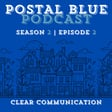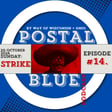Become a Creator today!Start creating today - Share your story with the world!
Start for free
00:00:00
00:00:01

Statements
On this episode of Postal Blue Podcast, we discuss the importance of sticking together in your craft, and unions supporting each other. Featuring Coffey and myself on this episode, we go back and forth over dignity and respect over the floor, treatment inside the workplace on all sides, and taking the proper processes to address situations.
#postalbluepodcast #nalc #usps
Recommended
Transcript
Introduction and Promotions
00:00:00
Speaker
Welcome to another Amazing Studios session. Subscribe to the Postal Blue Podcast on all streaming platforms and check out Amazing Studios on YouTube for video content. Also follow the Postal Blue Podcast community on X, formerly known as Twitter. We appreciate all the support we're getting and thanks for listening.
Hosts Introduction and Episode Excitement
00:00:21
Speaker
Welcome to the post blue podcast. We are your hosts or three of your hosts. I'm your boy ice, AKA LA. That is your boy. Hold on. Go ahead. Introduce yourself. And I am your boy black night. Glad to have y'all with us tonight for our second episode. Hopefully we give y'all some great content to ponder on to think on.
Inspiring Change in the Postal Service
00:00:46
Speaker
And also hope that generate conversation, not only in your household, but in your, your stations. And hopefully it generate conversation in your branches. And that's where we hope to inspire and cultivate other people into going out and talking about issues. And the more you talk about something, the more you shine a light on something, it can help change things.
00:01:16
Speaker
Because we are the grassroots. We are the people in each and every craft. And this is just not for carriers or custodians or clerks. This is or not even also to help management as well. We want to we want to talk about topics that we know are near and dear to our heart. You're getting the whole spiel. Getting the whole the whole spiel that, you know,
00:01:44
Speaker
I want we want to generate conversation that bring about change, not just we don't want to have water cooler talk. And that's all it is. We don't want to be upset for a day or upset for a week and then back to status quo. We want to we want to be upset to change. We want to promote positive change and understanding that we are we are the people who will make the post office great. And the post office gave us a great opportunity.
00:02:12
Speaker
And we want to thank them by making the company greater. We don't want to just status quo, we want it to get better. We want to evolve and we want to move forward. We want the company to prosper and we want to prosper as well. And the way we do that is talk about the issues, be upfront about the issues on both sides.
Challenges Faced by Postal Workers During COVID
00:02:32
Speaker
And sometimes we got to have uncomfortable conversations and that will be with not only with craft employees against management,
00:02:42
Speaker
craft employees against craft employees and also sometimes that's going to be craft employees against their own union. You know what I'm saying? Sometimes you got to look yourself in the mirror before you go start looking at talking about other people business and sometimes you have to go talk to you have to talk to your own union about things that are are plaguing your branch and playing us as a whole. So
00:03:12
Speaker
It's all about conversation and conversation we know rule the nation and conversation will change as long as we continue to ask for effective change.
00:03:24
Speaker
Okay, with that said, last week we did the new foundation, right? We laid the blueprint for what the post office is in its current form as of 2024 from the craft and station level point of view.
00:03:43
Speaker
Right based on personal experience And Sad to say it's not in the in the best state to reiterate very shortly before we get into today's topic
00:03:58
Speaker
which is the ongoing contract negotiations, is again before COVID. I think Caris was coming in. We're talking about the Caris contract on this one. Before COVID, people was coming in, that $16 has changed. It's going to vary in that $16. Some people came in at $16.50 before me. I came in at $16.76 or $16.79. So along that, this is,
00:04:27
Speaker
second quarter of 2019. Some people came in at almost 17 by the end of that year, right? So around the $16 range, this is lead up to COVID. I came the same year as COVID officially kicked in in the fourth quarter of 2019. It was officially a pandemic in November, December range in 2019.
00:04:54
Speaker
There was a lack of support for carriers during that that whole two year run. We could say if the rest of the good two years, there was a lack of support for carriers. There was the lack of structure. It was almost like management could do anything because the mail is more important than your safety or your life or your health conditions or whatever the case is.
00:05:14
Speaker
Um, they didn't stick to the 12 hour policy. A lot of people coming in didn't know that there was technically a 12 hour rule. Um, and even if the post office don't want to recognize it during that time period law.
00:05:29
Speaker
Law says that there's that there's rules and regulations also says there's rules and regulations for you attempting to work people 16 to 17 hours a day or whatever the case is Right, and we don't think any of that was reported but that happened Again personal experience. This is not hearsay. This is not slander. This is not defamation of character We're not going there. No one's name. We're both speaking from personal experience. We was here and carrying mail during that time Yes
00:05:55
Speaker
Coffee was a regular during that time, I was a CCA, not a PTF, I was a CCA during that time, right? I know for a fact, I've been there six o'clock in the morning and I know for a fact, I've left at 10 and almost 11 o'clock at night and had to be back up at six o'clock in the morning or be back at the station at six o'clock in the morning, personal experience. So with that, lack of also financial respect.
00:06:22
Speaker
they didn't respect our time before they didn't respect our wallets. We got no appropriate wages as far as our rates go that we should have got during that time. We didn't get any type of hazard pay that every other
00:06:38
Speaker
From my knowledge, every other delivery company got, including FedEx, including UPS, including DHL, and others who got extra little wages or extra actually entitled hazard pay during that period of time. We didn't get that, right?
Pay Disparities and Contract Issues
00:06:56
Speaker
And we was out there some of the most and longest. We was at every house in the zip codes, every house in the district with the risks.
00:07:05
Speaker
of catching it and we didn't get anything for that. Right. And at this point in time, I think coming out of COVID, I think the business model was hurt. I think it was hurt prior to that we had been going down, but it was really hurt during COVID. And I don't know again, I reiterate, I don't know if there's a department that specializes in retail and creating products, but it looks like we don't sell nothing. Nothing.
00:07:31
Speaker
When they talk about budgeting, budgeting, budgeting it because we're losing money, but who job is it to go make money? You know what I'm saying? Who job is it to create products to sale? Where's them people at? Why do they still have a job if they're not creating products and we don't have products to sale? You know what I'm saying?
00:07:51
Speaker
Things of that nature. And right now is we in the big budget cuts, big budget cuts. And this is this is the state that we are now supposed to be budget city in the post office. We're doing all these cutbacks and all these whatever the case is, although somehow we still hiring supervisor positions making 80,000 a year.
00:08:12
Speaker
but we're supposed to be cutting. We couldn't, we couldn't, but we adding $500,000 a year to the payroll by, by, by getting another six supervisors who don't do nothing. That don't make sense to me or who don't get proper training or the appropriate training or whatever the case is to me, that don't make sense. Right. We, we, uh, senior carriers who's already here after COVID,
00:08:35
Speaker
they felt the type of way a lot. This, this is rolling snowballing into the conversation. They was feeling the type of way, right? If you look at the new carriers that's coming in now, they're making around $23 an hour. I think last time I checked it was 23 19. I want to say respectfully, uh, maybe it's the high 22s, but I believe if I recall,
00:08:55
Speaker
correctly on that paper for the job. I believe it said 2319. I could begin to mix up with another craft, but I don't think so. Cause I don't think the, I don't think so. So let's say high 22s to be on the safe side or very low 23s, right? And again, if you take, if you go back five years when I came in at 1670 something, then we talking about almost a $7 increase in the past five years. That's the starting wage.
00:09:24
Speaker
Right. And going through the pandemic and up until now, they was purposely increasing the starting wage, the starting wage to make the job look more appealing to new employees. They did their purpose. So new employees pretty much went and got like a seven dollar raise. Maybe you can cut it like let's say a five dollar raise while the people that already work here didn't get no raises.
00:09:50
Speaker
Correct. Now, make that make sense. You know what I'm saying? The people that was already here, that was going through the tough, the ups and downs, they didn't get, they didn't get no wages. So now, five years later, you got people coming and making $23, when five years ago, somebody came in making $16. So guess what they at right now, five years later, around the $23, $24 hour mark. So then, what happens to my five years if I'm at
00:10:14
Speaker
It's just all hypothetical. I'm talking number. These are real numbers though. If five years later, if I'm at 24 and someone coming in and making 23, what was my five years worth? I could have quit five years ago and then just apply now came in at 23.
00:10:28
Speaker
You know what I'm saying? I didn't have to go through having COVID. I didn't have to go through health issues. I didn't have to go through, uh, ridiculously long nights and I wouldn't have had to do that and still could have came in with whatever ways we had now, uh, which is like the 22 23. That goes into this contract, right? This is what we're here for. Yes, sir.
00:10:47
Speaker
Um, if you want to hear me go about kind of more in depth on, on that, uh, this to the first episode. Um, well, at least not the first episode, but that episode, which is trailers, really the first episode, uh, go listen to the new foundation. I talk about an hour. I go through the periodic of what happened.
00:11:07
Speaker
uh in order pre-covid during covid and after covid um that sets the ground floor for everything we're gonna do going forward so you will be able to understand where people are coming from right so we don't have to keep backtracking for people who don't know i created a whole episode just for that that's gonna stack on top of that um so
00:11:28
Speaker
Now we're in a contract, right? I think our contract ended March of 2023. If I'm not mistaken, March of 2020 with that contract in the March of 2023. And now it's August of 2024 and they still have yet to settle on the new contract.
00:11:46
Speaker
Which means we haven't gotten a raise because there's no contract that dictate what that wage or raise it was supposed to be. Right now, I was talking to coffee early and I was asking some questions. Called a couple other people also asking questions and a lot of carriers seem to be lost or. Unknowledgeable about what the NALC is negotiating in the new contract on their behalf.
00:12:13
Speaker
Now I was acting coffee. I'm let coffee get into it. But again, I asked coffee and once we thought about it, I was like, man, I don't think I was, I was notified on what we negotiated because I don't believe I ever talked to somebody on what I would like. I don't believe that I ever took a poll on what I would like or like out the contract or like in the contract. What about the money? I think they're negotiating $30 an hour, but
00:12:35
Speaker
who said I was willing to accept $30 an hour. I'm saying when do we make that decision? And I definitely feel like the craft employee should be more active into knowing what their contracts are or what's being negotiated for them. Right. And what's being negotiated against like what they're what they're for and what they're not for in their contracts.
00:13:04
Speaker
by people that's in the same contract, but they're not technically in the same field. You know what I'm saying? In the ALCs, in the ALC, but the people that's gonna go to your contract don't carry mail. You know what I'm saying? The people that negotiate your contract don't drive trucks. They don't mail handle. They don't clerk. They don't custodian. You know what I'm saying? They don't do that. So how you know what I might need on the ground floor when you don't, you far removed from the ground floor. You know what I'm saying? So I let Kofia go ahead and speak his piece real quick.
00:13:35
Speaker
I mean, it's self-explanatory that is definitely a disconnect on what is going on. And, you know, we don't even know the people who's responsible for getting us a great deal or a bad deal. We don't even understand. We don't know those people. That's a huge deal. They don't put out polls to say, hey, what would you guys like to see?
00:14:05
Speaker
in a new contract. And let me say this because I know somebody going to be like, well, you're never going to get everything. Well, at this point, we'd never get nothing because we don't ever say nobody access what we want. That's like the craziest thing that's going to be in this contract. It's been an area of the contract since it was article three. Management has a right to do it. I'm paraphrasing.
Flawed Grievance Process and Management Issues
00:14:31
Speaker
Do what the hell they wanted to.
00:14:34
Speaker
then why do we have a contract? Who is nothing you can bargain for that? And what's crazy to me, that kind of like contradicts the whole contract. Correct. And I mean, I'm not a professional, but I would definitely be trying to make some type of case that made that that's almost like boy, man. That's like saying, hey, let's make a contract that
00:15:01
Speaker
that Davis versus Mayweather, right? I'll tell you Davis, you take Mayweather. You're gonna do $1,000 bet on Davis versus Mayweather, right? You're gonna sign the contract that says we both put $1,000 on the line. I got Davis, he got Mayweather. But I'm gonna put in there as well that if Mayweather wins,
00:15:27
Speaker
on his behalf, right? Cause I got Davis, that me paying you is up to me. But you, if you win, you have to pay me. But it's a stipulation. Remember the first stipulation is thousand dollar wager both ways. But then it's the second part that says I can choose if I want to pay him or not. But his part says that he has to pay me. What type of contract is that?
00:15:54
Speaker
It's backwards when it contradicts the other part of the contract. It says that you have to do something and then this part says kind of like if you want to that don't that don't even make sense. It makes no sense. It's it's the part of the contract that is it. I don't let me say this first. I'm not saying that the union is in bed with the post office.
00:16:24
Speaker
But if somebody says that to me and say, the reason I believe that is because they let them put an article three, I have to say, I, it's possibility at that point. It's a lot of things that's in the contract that makes no feasible decision. No, it doesn't make sense because think about it. I can force you every day.
00:16:50
Speaker
If, you know what I'm saying? If I need to be, if people don't show up to work, you got to work 10 hours. That's every day. Whereas it's carriers and stations, clerk at stations that have, that don't have people there. More likely don't have people because you have bad management in that station. Let's just, let's call it what it is. Then you turn me into a bad employee because I got things to do after work.
00:17:20
Speaker
And you're going to hold me two extra hours, but I can't come to you and tell you, I got something going on in my personal life that I need to leave two hours ahead of time. That's tell you, you're crazy. So if I'm crazy thinking I can leave two hours early, why is it okay for somebody to say, Hey, well you got to stay two hours. The contract doesn't make any sense.
00:17:49
Speaker
At one point in time, maybe it did. I mean, it makes no sense that I have to, if management breaks the contract, why don't we have a body or an organization separate from the union and separate from management that automatically pays me when they break the contract?
00:18:20
Speaker
I grieve it. I show you where they broke it at. We look at it and we say they broke it. And I'm talking about simple stuff. I'm not, you know, I'm not going to get into, uh, that's also a prime example. You got a grievance, you filed a grievance, you win the grievance. Management is supposed to pay. You supposed to get your money on your next check, but then they'll turn around and say, eh, we'll pay you when we feel like it. Correct.
00:18:49
Speaker
knowing that they do not supposed to mess with the grieving process because I tell people this all the time. The grieving process is only supposed to take 30 days. You should more likely the most simple things don't take that long. You came into work one day and your utility and you're supposed to have been on a ride. They said they said, no, we're not going to let you be on the route. We're going to put we're going to we're going to let
00:19:18
Speaker
This person be on the route. You know, you're supposed to do that. I'm all out of a grieving. This is what management says to you. Grieve it. So if that if their mindset is, oh, we're going to pay you cool. It's not their mindset. Their mindset is I'll pay you whenever I feel like it.
00:19:40
Speaker
Also, what I take from that in that moment where they said grieve it, that's telling me that you know you just broke the contract. Correct. And you don't care that you broke the contract. If you didn't break the contract, you wouldn't have told me to grieve it. Correct. The grieve only comes when the contract is broken. Absolutely. So they're normally breaking the contract continuously. I don't mean like once in the blue moon or just in emergencies on a daily basis.
00:20:06
Speaker
they are breaking breaking the contract and then sell it. Hey, just grieving and then you know what I'm saying? Whatever extra you supposed to get from from the grievance when I choose to pay you is when I pay you and then I know I know you I'm gonna have stewards on here. I know I'm gonna have a lot of knowledge of people on here and they're gonna come back and say well when you grieve it in you go non-compliance and they don't play it bro. Let's be honest.
00:20:38
Speaker
The old way of doing things is old. They got our playbook. They know what we're going to do, how we're going to do it. They got our playbook. And then let me just say this on the union behalf, because I want to make sure I say this to craft employees. It's trash that a steward got to call you 15 times
00:21:08
Speaker
to get a statement. That's trash. You see something happen to one of your one of your fellow co-workers. I call them my brothers and my brothers and sister in arms. It's trash that you not that you don't have they back.
00:21:27
Speaker
And I'm a piggyback on that right quick. We get back into contract, right? I'm gonna add something to what Koffee's saying. I'm gonna piggyback on the other part of what he's saying. On one part, we're telling y'all in the unions that they got y'all playbook. Simplified, management know what you not gonna do. Facts. They know the extent of the limit
00:21:57
Speaker
You're not willing to tell their carriers or their clerks to do this. They're not willing to, they ain't never willing to go to the extreme and they ain't never willing to cross this line. So we could continue to do this because they, worst case scenario, they gonna do this and still just tell the people, hey man, just do follow your own structures and follow grievance. Which I'm not doing because they don't pay grievances. Facts.
00:22:19
Speaker
Now, they might argue, hey, just look, okay, just something about me. I feel like if something happens, contract is broken, and agreements is followed on Leonard Anderson behalf, and Leonard Anderson is not paid on the next available payday or the second pay period of that. To me, that part of the contract is not a void at that point in time. That's not a void. So at that point, I feel like I'm never gonna follow those instructions again.
00:22:48
Speaker
And when you say, only you got to follow your instructions and follow grievance. Well, if you're not paying the grievance, then what's the point in me following my instructions? The whole benefit of following the instructions is following the grievance to get paid. But arguably, I can argue that you'll never pay me. You'll never pay me. So that's like, hey, coffee, give me a ride and I'll pay you. You know what I'm saying? I'll pay you when we get there because I ain't got no cash. I might get that off one time. Then I hop out the car and run off on coffee.
00:23:17
Speaker
How many times can I do that and coffee still go for it? Hey, coffee, let me get a ride, man. I'ma pay you when I get there. Then I never pay him when we get there. I'm violating. How many times you think somebody gonna continue to let you violate and they know what you're gonna do?
00:23:35
Speaker
The whole point in you paying me is to make up for violating. Technically, you're supposed to acknowledge the fact that you violated. You sound off on the grievous, you paid the grievous, and then technically you shouldn't be doing that act again. The management would do it again, the same day or to somebody else or the next day. The acknowledgement on the grievous process and you losing the grievous is acknowledgement that you was wrong in what you did. You shouldn't do that no more.
00:24:05
Speaker
Now that it was proven that you're wrong, why they still do it? Because they don't care. They don't care about what you got for you. They don't care about your rights. That's what it comes as, comes off as.
00:24:17
Speaker
I don't know. Now again, I've been someone that's been on the desk. I don't operate the same way, but I've seen it. Just before people get to hop out the window, man, you buy, I'm not biased. I'm very down the line on by the contract for better or for worse. Technically, we should be on both sides because the contract is, is, is a negotiation.
00:24:38
Speaker
I'm for certain things in the contract. I'm against certain things in the contract. I'd have been on management side to a degree and I'm a carrier by trade. So I see it both ways. I've been on the floor and seeing how people on my side get away with things. I've been on the desk and seeing how these people get away with things. And I see how the other side try to take advantage of because I've been on both sides. So I've been a carrier and seen management trying to take advantage. And I've been on the desk and seen carriers trying to take advantage.
00:25:05
Speaker
By my bad, the first time I've seen management, yeah, management trying to take advantage of supervisors, managers trying to get over on you, treat you a certain way. Then I've been on this and I've seen like dang, these clerks trying to get over these, these curious playing games, these, whatever the case. So I've seen it on both sides. I've seen on both sides, but like everything say it starts at the top. This, this, at this point, this is just the environment that we in.
00:25:29
Speaker
which always seems to come off like a hostile environment. It's what it comes off to be. Right? The second part of what coffee saying, I was saying this to a walking shout out Watkins, um, she's a carrier and also school,
Union Challenges and Lack of Unity
00:25:45
Speaker
right? Me and Watkins was talking the other day.
00:25:47
Speaker
and I bring up the rally. Just to call for the other point about the people writing statements and not writing statements, not standing together, right? We did a rally in Wisconsin, in Milwaukee, specifically. Was that last year? In front of headquarters, right?
00:26:06
Speaker
And the NAOC had got a speaker on behalf of the Milwaukee Transit, I believe, union. I don't know the name of their union, so my apologies, but got a representative on behalf of them to kind of give words, you know what I'm saying, to kind of like back up our union to a degree, right? Just say that, you know what I'm saying, we should be some type of unit. I felt some type of what?
00:26:32
Speaker
And I felt some type of way and I didn't say nothing until I was talking to walkers really, but I felt some type of way and thought about something that whole time. And it didn't really come to my mind until this year, right? When a lot of things didn't happen or over the past year, when a lot of things didn't happen and a lot of people hasn't stepped up or did whatever they parse is. And that is our senior union, I'd say like that is the APWU.
00:26:59
Speaker
at least under the APWU at least that I know of there's possibly four unions that I know of at least three because I think they will tell you handlers union or the mail handlers union is different than the clerks I would assume but it's at least four of us which is for carriers for clerks for mail handlers and for truck drivers right so I'm assuming it's at least four um
00:27:28
Speaker
At that rally, when we talk about a hostile work environment and we was talking about being harassed, why did we have to go get a Milwaukee transit union who not even federal. And we got three other unions that we work with under the same working conditions.
00:27:45
Speaker
You ever thought about that, man? You know what I'm saying? We work with clerks. That's crazy. Mail handlers and truck drivers who we all in the same hostile work environment at times, quote unquote, right? Depending on where you at and how you feel. Yeah, that's, you know what I mean? Everybody's own perception and experience. And we had to go to the state representatives to get a union that outside of us,
00:28:13
Speaker
And you could go right downtown, across from downtown. The APWU has a building right across from downtown, and they represent four unions that's all in the same building. And we work with them. So if the carriers are saying it's a hostile work environment, possibly, then most likely the clerks are saying the same thing. At this rally, when they talk about hostile work environment, why everybody else not there? It wasn't necessarily a carrier rally.
00:28:42
Speaker
Right. You know what I'm saying? What was it? What was the clerk's union reps or or anybody on the clerk's side just to come down there and say, yeah, man, we're tired. It is. I work in the same place. What was the mail handlers at? Well, they're union reps. What was the truck drivers at in the union reps and or the union reps and we all work in the same facilities. That's that was crazy to me. You ever thought about that, man? Yes, is is no is no unity.
00:29:12
Speaker
among the group. It's like. My day is this. Y'all make sure to hit that share button, you know, because we're going in on this one. I'm saying we're a little bit off track, but we don't get we'll get back on the contract because this is relevant to what we're saying about being in the know on what somebody is speaking for for us and not being in the know of. Go ahead, coffee. Correct.
00:29:41
Speaker
The thing is, we have to get to a point where the reason management doesn't care because they know we don't care. That's just truth. You listening to this, I want you to ask yourself, how many times have you watched management do something to somebody else and you said nothing, you did nothing. How many times
00:30:10
Speaker
Have you talked to a steward or you try to talk to somebody that's in the union and they told you some and it really didn't answer your question. You were just like, you got tired of me. Like, don't worry about it. I don't even care. No, you never can get tired. When you in a fight ain't no is no time is no, you can't rest in a fight. You can't rest. We're in a fight.
00:30:39
Speaker
Management is coming to win. They're dead set on making sure they can get slave labor. Now, if I said that to you and your meeting, they'd be like, oh, oh, oh, oh, oh, oh, don't say that. What do you mean? Management could put me on EP and then pay me when they wanted to. I went on EP, got paid the next year. I put on EP in October.
00:31:09
Speaker
then get paid until the next year in August. Let that settle in. That comes because I'm not afraid of what you're doing. When the last time you heard the union saying, hey, guess what we're going to do? Everybody on the off day since they don't want to come up and get these contracts up, everybody on the off day because we all have off day.
00:31:39
Speaker
We're going to go down today to the local head court, whatever the main building in, in your state, in your city, in your town. Hey, we're going to have some lemonade, we're going to have some water, we're going to have some bloom, bring your whole family. This affect your family, right? The contract affect your family. Who wants to go home and tell their kids, we can't go to the state fair because daddy doesn't make a livable wage.
00:32:09
Speaker
And your kids say, well, dad, I don't understand. You're working, you're working 10, 13 hours a day. How are you not making money? How do you go home and say that to your wife, to your husband? How do you say to your mom and dad that the social security doesn't pay them enough and you're supposed to be helping them? I don't have it. You don't have it because you don't want it.
00:32:40
Speaker
It's gotta be personal. If it's not personal about this contract, then I don't know why you're still working here. It has to be personal that, hey, we don't know what they asking for. It has to be personal that we don't know who asking for it. It gotta be personal that we're not getting the information. We're not getting it through social media. We're not getting it through our branches. We're not getting it through our stewards.
00:33:06
Speaker
Or you have to, like I did go to five, six, seven different sources just to piece some things, possible things together and you still don't got it all at all. So far I've known maybe three things that they might be negotiating on. But I don't went to multiple sources. I should know everything. If it's pertaining to me and my money, my career, I should be able to find this somewhere. Like everything.
00:33:34
Speaker
I should have got something in the mail. I said, unless you got to get a phone call, all of us should have got something in the mail that gives a whole rundown on what we, on what's going on. When again, prior to that though, everybody should have got something to take a poll to at least let their voice be heard on what they even looking for.
00:33:56
Speaker
And I can't find no one that said that they've seen this poll or took some type of survey or whatever the case, that gave the opinion to their union or union steward or whoever for them to negotiate on their behalf to the best of their abilities. I've yet to find the carry that said, yeah, you know what I'm saying? I told do what I want and that's what they going to get.
00:34:20
Speaker
So right now, I don't know what they're going to get. What are they going to get? And what are they, what are they trying to take out the contract? What are they trying to put in the contract? And what are they trying to take out the contract? I don't, I should know everything if it's pertaining to my future. Correct. I don't, I don't know if people know this. UPS used to fly our packages wherever we need to go. Now we're not with UPS no more with FedEx. Well FedEx is in the United States Postal Service. Agree in April 1st.
00:34:50
Speaker
on a five-year partnership with them. They can go outside and agree with people. But the people who come in every day, work they butt off. Because when I was a CCA, I was a lousy father. A side note, they also negotiated that contract for that $1.25 a package for Amazon. Correct.
00:35:20
Speaker
So they can get deals done. I believe it's $1.25, a cookie mistake. I think I'm pretty sure it's $1.25. Do your research. They can get deals done. When the person that they're dealing with is not gonna, is not gonna play this, oh, let's talk. I don't wanna talk. I don't wanna talk. The money in my bank account talks to me. So guess what I need you to do? Add them zeros. You don't wanna talk? All right, cool.
00:35:50
Speaker
How is it every time it's contract time we are working under the old contract? Every country. Who else in business wants to work under a old contract? You know the end of the contract coming because we usually almost one year in the contract before it gets signed.
00:36:16
Speaker
So that's, that's the, let me clarify, right? So remember I said earlier, our old contract for carriers ended in March of 2023, if I'm not mistaken, March of 2023.
Delayed Contract Negotiations and Their Impact
00:36:27
Speaker
This is August of 2024 and we've yet to settle on a new contract. Now when they do settle on a new contract, that's going to have to be backdated.
00:36:36
Speaker
to when it was supposed to start. Meaning, let's just say by the end of this year, everything gets settled. We're already almost two years into the new contract and most of the contracts only last two to three years. So we'll be halfway through if not majority of the way through the new quote unquote contract by the time it actually gets finished. And technically should be starting the next talks right after this for the new one. Technically, you know what I'm saying? Because we behind.
00:37:09
Speaker
So I don't know. And that's the part that should offend you the most is that they keep every year. They don't value us. Like me personally, if anybody asks me, I'm like, hey, the strike, the strike calls. We got to throw that out of the building. Oh, well, you know, Congress want what the Congress need to get involved and get the post office on on the straight and now.
00:37:39
Speaker
That's what Congress need to do. The House, the Senate, the President. Whomever. Because if you value me, we would never be talking about a strike. This is the crazy part, right? Now, me and Coffey, we don't always see eye to eye, right? Correct. And at times, Coffey could be extreme on things. At times, I could be extreme on things. You know what I'm saying? This is one of the ones that I'm not going to say. People would say it's extreme.
00:38:09
Speaker
But I don't think it's extreme. Facts. I would say, after strike clause, leave it in there. Leave it in there since the government, what we used to call it, big brother, wanted it in there, right? Correct. So now, let's place responsibility. Going back to what Koffee said earlier, statements. Statements. Let them continue.
00:38:38
Speaker
to harass you. First, this is what we need to do. Everyone needs to go look up the definition of harassment on all sides. I said this before. Go read the definition of harassment. Someone who's quote unquote possibly harassing you can't tell you that they're not harassing you. Correct.
00:39:00
Speaker
You don't determine, have you read harassment? You can't determine that I'm not a victim? Correct. Right? Same way with hostile work environment. Management can't tell you, tell you, this is not a hostile work environment. Because you're not in my body or my mind to tell me how do I feel or how you're coming off to me or to other people around me. Because when you're not around, multiple people is feeling some type of way in this environment.
00:39:29
Speaker
Multiple people is talking about quitting. Multiple people is talking about doing this. Multiple people is talking about calling in. So there's something wrong with the environment. You don't dictate if it's not a hostile work environment. Y'all need to go look up the definition of harassment. And that's because you need to be using it properly.
00:39:49
Speaker
And then you need to be looking at house style work environment. And you need to be looking up discrimination, right? And discrimination varies from gender to gender. It can be race related. It could be handicapped. There's various discrimination levels, right? And going into what Koffee said, statements. Y'all need to be putting paperwork on management. Every time.
00:40:17
Speaker
You can fire a supervisor. You could get a supervisor fired. You can get a manager fired. So if they want to leave the no strike in there, meaning you want us to deal with whatever, cool. Now you going to take responsibility then. Cause I'm a, we should be working our way up the chain.
Accountability and Management Failures
00:40:32
Speaker
We should be, we should be putting paperwork on manage on, on supervisors. Yes. Then we should be putting the paperwork on that supervisors manager. If it, if it, if this continues, then it can't just be all the supervisors that come in this place. Then you,
00:40:46
Speaker
Under your umbrella? So at this point, you the common denominator. If I get rid of two or three supervisors, they all doing the same thing. And again, you the manager, it's your station. It's happening on your watch. Then I'm putting paper on you next. I think you gotta get going. Should nobody be settling for money? I'm going for the manager. Now, this is the key to this, right? Because I've been in this boat.
00:41:09
Speaker
The manager, as soon as you get the manager in the office, they will throw their supervisors under the bus. Yes. Man, listen, when you got them lock sink, and when you got them hook line a sinker, man, they pointing fingers, bro. They snitching.
00:41:24
Speaker
Hey, they snit. They telling on each other. My manager told me to do this. My man. Oh, oh, he did. Did he? Okay. Okay. So now I need to go see him with my lawyer. I need to do another EO on the manager and then get that manager. We working up the line like Frank Lucas family.
00:41:40
Speaker
A manager, now we need to see you in here, right? And why are you doing this? Why are you doing that? Did somebody tell you to do this? Well, my CSOM, all your CSOM telling me, okay, we get somewhere. I still want your job though. You know what I'm saying? And now we going for your CSOMs until we get to your postmaster and then your district manager and whoever we need to go up the line. We didn't take all these jobs. We need to know, just keep going. We need to keep going until we get to the postmaster general if need be.
00:42:09
Speaker
EEOs is not on the side of management. Let me clarify.
00:42:12
Speaker
So department is its own individual department. It represents the government. It's an actual like its own federal department is to make sure that there's a fair working environment across the board for all agencies in all organizations under the federal umbrella. They don't represent management. Some of y'all I've heard some of y'all think that what's the point because you know what I'm saying? EEO management not going to discipline management. They're not management.
00:42:42
Speaker
You're letting a kind of like a mediator who should be mediating. See, it's almost like a judge. Your EEO specialist will be the judge that hears your case. Y'all will have a case. And you as a carrier, clerk, or whatever craft that you in will present your case and your facts and management, whether it's a supervisor or a manager or whoever it is that you put in the case against will have to present their situation to the EEO specialist.
00:43:09
Speaker
That specialist would dictate what might be true, what might be not, and then what should come out of whatever the case is with whoever wins if somebody wins. This case, which is why we need to do our due diligence on the craft side. Know what it is. When it's happening, when you see it, you need to speak up. You need the right statements. You need to notate time and dates.
00:43:33
Speaker
Build your case. Don't just hop out the window in one situation. I wouldn't because I'm looking for a solid airtight case that you did this repeatedly because I want your job. I'm going for your job. I don't want to get somebody retrained. Some of the biggest things that you can come out of your EO with is money, which a lot of us take.
00:43:53
Speaker
I say us because it's the craft side. A lot of us take, cause I know, I know people that should be out, but they're still, they're still here. I know for a fact that they're still here because people took settlements instead of asking for them to be fired, to be terminated. You shouldn't have took the settlement. You should ask for them to be terminated. You shouldn't have asked for, don't take them being retrained no more because they're being taught to do this by upper management, which means they're not going to stop. Cause they're getting instructions to do this type of stuff.
00:44:24
Speaker
So don't go for the, Hey, do you know what I'm saying? Can we just, how about retraining? You feel about retraining? No, I don't feel like that because he's not doing this under his own free will. We, we've all been in the station and heard these telecoms. Yes. He's not doing this on his own free will. You know what I'm saying? I don't know if he a sucker or not, but the person above him was telling him to do this type of stuff. And after this EO, I don't feel like that person is going to tell him to do differently.
00:44:48
Speaker
He probably just gonna tell him to do it smarter. So no, I feel like he's just all the way around corrupt. Cool, he need to go. And then I work on the person that was giving him those instructions next. And we need to work our way up the food chain.
00:45:00
Speaker
Most stations, or all stations, the craft employees makes up that station, not management. You might have two or three people in management on the average station floor, the average station floor. You might have 30, 35, 40 employees. That's craft. You might have like 30 carriers, five clerks, a custodian, a maintenance guy in there, ought man. You got utilities. You might have 40 people in the 30 route station.
00:45:29
Speaker
At least 15 of y'all should be doing paperwork consistently. Building y'all cases. They can't fight it. You can attempt to, this is where the settlement's gonna come in. You can't argue, they can't argue that it's not a hostile work environment when half the station is saying that it is. And half the station got it's paperwork on days that you did this and you did that and you said this and you said that. And then you came off this type of way and you did, stereotype case on them.
00:45:55
Speaker
But we ain't doing that. We not using the tools that we got. Management, don't wait for management to punish management. I don't think it's gonna happen. They will throw each other under the bus, but managers not gonna get a bad supervisor out of there. Your C-sign's not gonna get a bad manager out of there. They all gonna be together. Under Naps, the supervisors association. They all under one umbrella.
00:46:22
Speaker
You don't wait on them to do it if you don't see that it's been done. Now we done known supervisors to do some wild things in these stations and he's still in these stations. So don't wait on management to punish management. You gotta go punish management. And our voice is bigger than theirs. Yes. Craft employees run the post office, not management. Absolutely. Let that sink in. If we don't come to work, there ain't no work being done.
00:46:52
Speaker
But if they don't come to work, majority of the work would still get done. Maybe not all, but majority, which is far more than what got done when they came to work. And we did. I've known carriers to come in with no clerks and start doing clerk work. I've known carriers to sweep floors, do something in the back, straight up the bathroom, which ain't got no custodian. And then they still carry mail. They'll go supervise on the desk and they'll go manage your station. Carriers done done at all.
00:47:20
Speaker
I don't clean bathrooms, I don't carry mail that day. Came back and threw packages the same day. Now check this out. Now when we down, have any of y'all seen the clerk go carry mail? Absolutely not. Have y'all seen a custodian go carry some mail, deliver some packages? Absolutely not. You ever seen a maintenance set? Go carry some mail, deliver some packages. You know what I'm saying? Nah. Craft, run the stations.
00:47:47
Speaker
Craft run the post office. Carriers run the station. Because the carriers on the back of the carriers is gonna dictate if your work get done or not. The carriers don't come to work or it ain't gonna work for you. Then they ain't gonna work. It's just gonna be
Past Inefficiencies and Future Improvements
00:48:01
Speaker
what it is. You can report that mail is what you can do. You can't do nothing about it. Y'all not gonna get out and deliver it.
00:48:07
Speaker
Y'all don't think y'all gonna do try to put people in office the next day or whenever, whenever they come back. But they didn't do nothing today. What if I'm not there the next day or the next day after that or what if I start mismanaging the contract and then just getting out of doing it. Then y'all be mad. When people come back with FMLA, when people come back with restrictions, man, he only doing this because he don't want to work. Then they start saying disrespectful stuff like that to you. Be little in you. How much of this, how much of this, the insults are we going to take?
00:48:37
Speaker
And half of them on the desk is on the desk because they didn't want to do their job. Or wasn't good at it. Usually they're terrible. And most of the carriers, y'all know that. Most of the carriers in the stations know the bad people in these stations.
00:48:58
Speaker
as far as management go. They know who they used to carry with and can speak on a supervisor or managers carrying skills like man Luke's trash. We had to always go help dude. She was always bringing mail back. She was always running whatever the case is she was doing. But you hear the stories about all of them. I ain't gonna say all of them like every single one of them, but most of them.
00:49:25
Speaker
Ooh, coffee, you got a buzz going on over there. You got some clippers or something? Yeah. Yeah. Also, let's not forget, a lot of these people, that's prior to us, that was carrying, let's say carry, on the carrying side, they carry mail.
00:49:53
Speaker
With shady, doing shady things on the streets. Back in they day, in the 90s, they carry mail in the 90s and early 2000s, is the reason why we got scanners in the first place. You can't sit here and tell me, yeah man, y'all got stationary time, y'all playing games, y'all out here stealing money from the post office, okay.
00:50:11
Speaker
What, what was you doing back in the late nineties? Cause last time I checked, when y'all liked to claim mail was so heavy, you had 10 trays. Yeah. And you had nine blocks and 10 trays and you was done at 10 30 and then you was in grocery stores and strip clubs in the afternoon. Y'all was at bars in the afternoon. They created whole TV characters on TV and TV sitcoms about y'all, man.
00:50:37
Speaker
because y'all looked crazy. The guy on Cheers was in Cheers every day on that TV show. In the afternoon, because you could look through the windows in this daylight outside, and he got his uniform on. That was a running gag based on what y'all was doing. They didn't just create that. Y'all was doing that. And the world knew that, or the United States knew that. It was a running joke. This is where they come from. Dude on Seinfeld, George, he was a mailman. Dude was never at work.
00:51:06
Speaker
You know what I'm saying? You was there working with all of that sound for your house. And you talking something like, man, she been working. You know what I'm saying? These shows is in the 90s, man. This was about y'all. Y'all did this. They created scanners to keep track of y'all. Way before we had packages. Carries, if you didn't know. Scanners started before packages. They created scanners to keep track of the employees.
00:51:33
Speaker
of these people that was carrying mail in the 90s and early 2000s, before we got packages. That's what the scanners was for. So a person can't tell you that you're still in time and they were still in, man, hours, half days, all days, back in they day. And again, if you ain't carried in this day, I can't speak on if you was good or not.
00:51:59
Speaker
Now, to management side, they gonna act like that don't care. That don't matter. It matters what you trying to put standards on me and you never fit in the standards yourself. You know what I'm saying? Like that don't make sense. Hey man, you should be at the office at 45 minutes. Have you ever been at the office at 45 minutes? I'm just asking.
00:52:20
Speaker
You could say, yeah, no, I don't know. You know what I'm saying? I bet y'all can call around and find out though. You know what I'm saying? I bet y'all can contact. What station you started at? What station were you from? You do the history. I could call around. I know somebody at most, every station. I can call in and figure it out and get the word on if it was good or if it was horrible or not and what you was doing. And then, that's not even mentioned in the dirt that you done got on your name since you been on her desk. But we ain't gotta go there.
00:52:48
Speaker
Um, but yeah, man, something's going to have to happen. We're supposed to talk about the contract on this. We might have to, we might go into a sun. Cause we finna be an hour on this and we just cut this one. This, this one, uh, once we finished this, we ended up cutting this into two. Um, you got something else?
00:53:07
Speaker
on the on the on the craft uh standing up representing and using these tools but on that note y'all make sure y'all check out your OSHA guidelines as well and y'all check out federal law which both supersedes the post office rules and regulations and instances so no nobody can make you do over 12 you can come back in 12 is a man you still gotta go i ain't gotta go do nothing federal law says i don't
00:53:32
Speaker
And if you think that you can, you can talk to an attorney, and that's gonna be one of the next steps. But we'll talk about that when we get there. Oh, with that, never be afraid to go into the office, y'all.
00:53:45
Speaker
That's actually where we get it done at is in the office because that's where they got a notate. They got a notate the things that you saying, bro. You got to get this on paper. This is where you let them know, hey, man, just a heads up in this, whatever,
Community Engagement and Podcast Involvement
00:54:01
Speaker
whatever. They say they write you a fulfill the file instructions or whatever the case that they told you to do something that was super improper multiple times or whatever.
00:54:08
Speaker
When you go in there, they asking you why you so and so and so and so, you make sure when you, after you get your savings, say, hey, man, I also want to go on record and saying that I'm feeling harassed. And I'm letting you know now that I'm feeling harassed and I've been feeling uncomfortable in this, in this work environment. They got to no take that down, right? The one of the ways that you, you first get somebody on harassment is letting them know first that you've been harassed. Then if they continue it after that, like the line of sinker, man, that's all we need.
00:54:38
Speaker
and use them, use them in mass. Use them in, listen, a hostile work environment opens the door for all of y'all to do the same paperwork. That's almost like a class action. You get what I'm saying? If management did something, they flew off the handle, threw an item across the, everybody in there technically could walk out. I've done it. Hey, at this point in time, I no longer feel safe. I don't know what's going on. You know what I'm saying?
00:55:03
Speaker
I feel like, and what I'm going to do is, and I put my hands up in the air, I put my hands up, I feel uncomfortable, I feel unsafe, you know what I'm saying? I'm feeling like whatever the case, hostile work environment, you know what I'm saying? And I feel like my safety might be in question. I don't know what's going on. So what I'm going to do is I'm about to clock out and I'm going to leave the premises and contact my union rep and get up out of there.
00:55:25
Speaker
and they're gonna have to pay you. This is all legitimate stuff though. So don't do this on any given thing because if you're using it for what it's actually meant for, you can get that paperwork put on somebody and you should be getting paid and you will get paid that day because you're not leaving under, yeah, and that's falls on management, that's their fault. So they gotta pay you for that.
00:55:49
Speaker
Yep, same thing with harassment. If you continue to be harassed and you in the office, you got to get out there, you got to get... Hey man, listen man, I'm doing my best. I ain't walking around talking to nobody, ain't doing this and that. I'm in my area of working. I'm working. Paperwork says from arbitration that as long as it's work to do, I'm supposed to be in the office working. As long as it's mail the cases, I'm supposed to be doing that. Now if I ain't doing that, if I ain't over here and I ain't over there and I ain't just walking around, I could be having a conversation while I'm working. I'm working.
00:56:17
Speaker
You want me to get out of there by a certain time, but I'm working. You know what I'm saying? The paperwork says as long as there's work for me to do, I'm supposed to be doing it. Unless you're telling me to delay mail. But also at the same time, you're not finna keep coming over here no three, four, five, six, seven, eight, 10 times. Saying the same thing while I'm in here. At that point in time, again, about your third time, I'm gonna be saying, hey man, I'm starting to feel like you harassing me.
00:56:42
Speaker
I'm working. I'm not over there talking. I'm not just walking around so on, so on, so on. So I'm not just whatever the case is. You cannot like the speed on how I'm casing or working, but that's, that's a personal problem. That's on you. I'm working though. So I'm in my right. I'm in the right right here and you, I'm starting to feel like you harassing me. Make sure, make sure you said it as a, as a good tone. Don't be yelling, but you want to make sure that somebody is hearing you because you could, you have a witness.
00:57:10
Speaker
Hey, and if you're a witness, stop being scared to be a witness, man. If you saw it, you saw it because with the shoe on the other foot, we got to get this person up out of here. We got to get these people up out of here. It ain't just me. They just so happened to fall in a trap on me. I'm just so happy for them to use this tool on them.
00:57:33
Speaker
if they keep coming over here because best believe they come over here another one or two more times or depending on what they say that next time. Hey, at this point in time, I feel like it's a hostile work environment and I'm being harassed and I'm out of here. I'm finna feel this out, clock out, lead these premises, contact my union rep or contact the union. I'm gone. I ain't finna go, don't argue with them. Don't go back and forth. This is for both sides. Y'all shouldn't be arguing with nobody.
00:58:00
Speaker
Y'all shouldn't be going back and forth. Shouldn't nobody necessarily get a high tone. Sometimes you gotta catch yourself. And I know sometimes emotions get high, can run high. We gotta catch that though. You know what I'm saying? Especially if you plan on doing what you gotta do the right way.
00:58:14
Speaker
You know what I'm saying? Make sure, as much as you can, that you're in the right when you do whatever you gotta do. That's how you hook, line, and sinker. You know what I'm saying? When we go into office, you can't say that I yelled at you. You can't say I called you out your name. You can't say I disrespected you, per se. I didn't cuss you out. I didn't use no profane language. I didn't get loud. I didn't raise my voice. I said,
00:58:32
Speaker
I feel harassed. Next time you came, I said it again. You seem to feel some type of way. I said, you know what? I'm going home. Whatever the case, I did things the proper way. I clocked out. I mean, yeah, I clocked out. I filled out my slip. I gave you my slip. I left the premises. Don't get mad. Don't let them get you there on either side. Don't let them get you there.
00:58:54
Speaker
There's dignity and respect on the workroom floor. That's for everyone. Carriers, excuse me, carriers, clerks, supervisors, managers. Dignity and respect is for everyone in the station, everyone on the floor. We all adults in this building. Let's act like it. You could not like something management. You could not like something craft. You know what I'm saying? But that don't give you the right to disrespect people just because you don't like something.
00:59:25
Speaker
Now, again, we're setting up the groundwork, man. There's a lot more to be talked about. We already did an hour on this. If anybody got any questions, make sure you go join our community on Twitter. Well, X formerly known as Twitter. It's called Postal Blue Podcast. You can find it on X.
00:59:46
Speaker
postal blue podcast as a community. Go over there and follow. I upload. We upload content over there. We've got photos. We talk. You get the heads up on shows. We also got live spaces, more live spaces coming where we pull up people, craft employees, management employees, or whatever the case. They need some knowledge. They got some knowledge to give. We'll take that too. They know what things we can, you know what I'm saying? Be part of the conversation when we do those live spaces over there on X. But make sure you follow that.
01:00:15
Speaker
Um, for more of these conversations and we will have more of these conversations. Uh, for the next few though, we're going to get into the, our expectations of the contract. Subscribe to the podcast for all future episodes and make sure to share with someone. We appreciate everyone and there's a lot more to come.



















